Caucasus Analytical Digest

Caucasus Analytical Digest (CAD) is a monthly online magazine published jointly by the Caucasus Research Resource Center/Research Centre for East European Studies at the University of Bremen, the Center for Security Studies (CSS) at ETH Zurich, and the Center for Eastern European Studies (CEES) at the University of Zurich. CAD analyzes the political, economic and societal situation in the three Southern Caucasus states of Azerbaijan, Armenia and Georgia in terms of the international and security dimensions of the region’s development. CAD is edited by Lusine Badalyan, Farid Guliyev, Diana Lezhava, Lili Di Puppo, Jeronim Perović, Abel Polese, and Koba Turmanidze. The corresponding editors are Heiko Pleines and Andreas Heinrich, and the layout editor is Matthias Neumann.